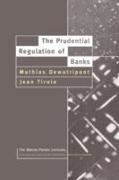Read more
The Prudential Regulation of Banks applies modern economic theory toprudential regulation of financial intermediaries. Dewatripont and Tirole tackle thekey problem of providing the right incentives to management in banks by looking athow external intervention by claimholders (holders of equity or debt) affectsmanagerial incentives and how that intervention might ideally be implemented. Theirprimary focus is the regulation of commercial banks and S&Ls, but many of theimplications of their theory are also valid for other intermediaries such asinsurance companies, pension funds, and securities funds.Observing that the mainconcern of the regulation of intermediaries is solvency (the relation betweenequity, debt, and asset riskiness), the authors provide institutional background anddevelop a case for regulation as performing the monitoring functions (screening, auditing, convenant writing, and intervention) that dispersed depositors are unableor unwilling to perform. They also illustrate the dangers of regulatory failure in asummary of the S&L crisis of the 1980s.Following a survey of banking theory, Dewatripont and Tirole develop their model of the capital structure of banks andshow how optimal regulation can be achieved using capital adequacy requirements andexternal intervention when banks are violated. They explain how regulation can bedesigned to minimize risks of accounting manipulations and to insulate bank managersfrom macroeconomic shocks, which are beyond their control. Finally, they provide adetailed evaluation of the existing regulation and of potential alternatives, suchas rating agencies, private deposit insurance, and large private depositors. Theyshow that these reforms are, at best, a complement, rather than a substitute, to theexisting regulation which combines capital ratios with external intervention in caseof insolvency.The Prudential Regulation of Banks is part of the Walras ParetoLectures, from the Universiy of Lausanne.
About the author
Mathias Dewatripont is Professor at the Universite Libre de Bruxelles, a Research Fellow at its European Centre for Adanced Research in Economics and Statistics (ECARES) and Research Director of the London-based Centre for Economic Policy Research (CEPR).

